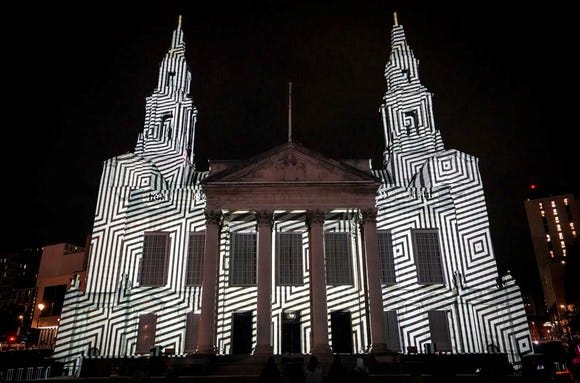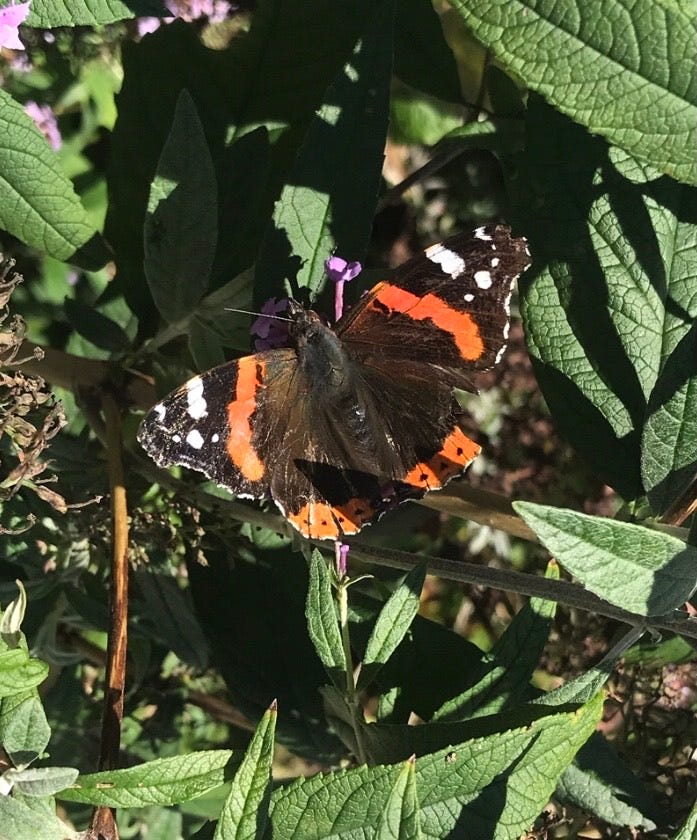If they tell you you can't, then you can
This week's newsletter features a song by Chumbawamba (no, not that one), research about the power of action-focused storytelling, art in the dark, composting and butterflies.
It turns out Leeds anarchist punk band Chumbawamba had more than one song.
Including this lovely one about the Kinder Scout mass trespass in 1932.
It came to mind as I’ve been thinking a lot about agency over the last few days - “knowing how to act in order to bring about an intended effect.”
Those trespassers had agency. They saw an injustice. They knew what they wanted. And they took action. Action that met resistance, and saw some of them imprisoned, but action that changed society for the better.
Do you sometimes struggle to know what to do in response to the climate crisis?
I’ve been thinking about this a lot more over the past few months, whilst I’ve been exploring what to do next, after leaving my job in the summer.
I’m not alone in wondering what I should focus on. How to make a difference.
That lack of “agency” many of us experience doesn’t feel great, to say the least.
And I’ve been exploring how to respond to that, both personally, and in my work with other people and organisations.
I came across a really interesting academic paper last week from Dr Kris de Meyer et al - “Transforming the stories we tell about climate change - from “issue” to “action”.
This line jumped out at me:
“In the absence of agency, awareness and concern [about climate change] do not automatically lead to action. Rather, they can lead to long-term anxiety, apathy, or denial."
That rang true.
All too often, we think that we just need to give people more facts about the climate crisis. Inspired by those facts, they’ll take action and all will be well.
Sadly, that’s mostly not the case.
Whilst knowledge is important (particularly in a world full of fake news) it’s far from inevitable that more facts will lead to more action.
In fact the opposite can happen. I’ve experienced this myself.
You freeze in the face of an overwhelming problem.
It’s unclear what you can do. Which can lead to you doing nothing. Further deepening the climate anxiety you may already be experiencing.
We need better stories - stories about action, that give us hope
It’s well known that as humans we respond well to stories. We’ve loved them since we were babies.
And better climate storytelling is central to how Dr Kris de Meyer et al think we can respond more effectively to the climate crisis.
In short, the researchers make the case for putting "people taking action" at the heart of the stories we tell about the climate emergency.
They suggest that people develop agency through learning from the actions of others.
They also suggest that "....rather than telling [people] what to do, climate storytelling should support [people] in discovering how to act."
And that we need "....a systemic approach to support the development of new concrete ways of "knowing how" to act on climate change."
This makes a lot of sense to me. The importance of telling better stories, alongside a focus on building people’s capacity and confidence to work out for themselves what they can do - ie where they have agency.
This is why you’ll notice me telling a lot of stories of people taking action over the coming months.
As Greta Thunberg said,
“Once we start to act, hope is everywhere. So instead of looking for hope, look for action. Then, and only then, hope will come.”
🎧 This week’s podcasts - composting, and cleaning up our air
🌻 Compost corner. I enjoyed this podcast from BBC Science Focus which dug deep into the subject of compostable and biodegradable packaging.
It features Mark Miodownik, author of an excellent book about all sorts of materials we take for granted, Stuff Matters.
Mark also organised a citizen science project called the The Big Compost Experiment (which I took part in) - inviting people across the country to keep an eye on how well “home compostable” and “biodegradable” materials composted in their compost bin at home.
As Mark explains, there’s a whole world of difference between conditions in your average home compost bin and an industrial composter. Which can mean, as I’ve discovered myself, that supposedly “compostable” packaging is still hanging around in your compost heap 12-18 months later. If you’re interested, I wrote more about this here.
🔧 Can we fix it? Yes we can. It’s great to see Leeds University upping its citizen engagement game - with a new podcast series called How To Fix… I enjoyed the first episode, which focuses on how to clean up our air.
📣 If you do one thing this week… join a Climate Fresk
Last week I joined half a dozen people from around the world for a Climate Fresk workshop. Over three hours where we worked together to understand the climate crisis - and explore what to do about it.
As I explored above, it was all about increasing my knowledge - but with a clear focus on developing agency.
I really enjoyed it - it’s a fun way of exploring the issues together - and much more engaging than a three hour lecture. There are loads of online workshops and plenty of in-person workshops too.
I’m going to train to be a volunteer facilitator - so I’ll let you know when I’m ready to host a workshop in person or online - if you’d be interested in me running one let me know in the comments.
💡 Illumination, imagination, inspiration
Light Night Leeds is one of my favourite things, every year.
And this year certainly didn’t disappoint.

I love seeing so many thousands of people wandering around Leeds city centre. It’s a wonderful, easily-accessible, free cultural experience - and I think things like this also help us to imagine how things can be different to how they are right now.
Like, as I explored in more detail here, how streets full of cars can become streets for people.

🦋 And finally….
I wrote here about all the red admiral butterflies that have belatedly discovered the buddleia I planted in my garden last year.
I’ve been trying, over time, to make my garden more wildlife and pollinator friendly - and slowly but surely I’m seeing the results. Like for so many people, the endless beauty of the natural world - alongside its fragility - is what keeps me motivated to do what I do.







I agree! We are socialised from a very early age to believe that there is an action we can take to make things better, to solve problems, to mould the world and to feel bad, to be marked down, even to be punished if we don’t find the answer. So the emotional response comes from this early conditioning, perhaps. To move on from it we need to escape the conditioning and perhaps from the belief that we should find a right action and that the only way to judge our actions is in their impact in the world (a utilitarian/consequentialist perspective). Perhaps we can’t solve it? Perhaps we are bit players without the ‘agency’ needed? Even the Musks, Gates, Bidens… none of us can find the right action in a utilitarian perspective. But we can act with as much love and care as we can, and pay attention to impacts and learn. This is to embody an ethic of care. Is it enough to save our life’s? Who knows? But I’m pretty clear that utilitarianism and it’s flourishing in capitalism has very nearly cost us life… I’ll look forward to our next walk’n’talk!
Ironically the last line should read ‘exercise care and love in our own agency’